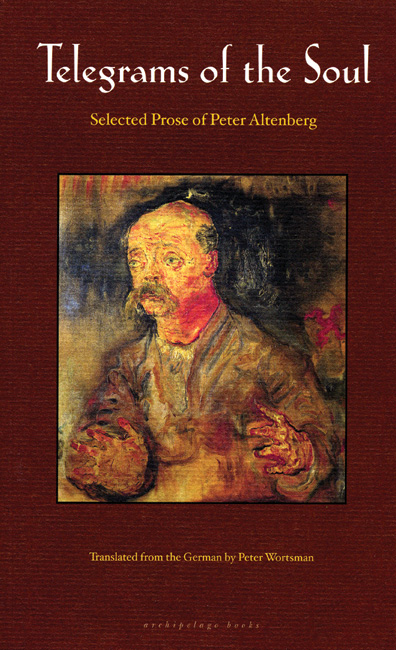Book Description
“If it be permitted to speak of ‘love at first sound,’ then that’s what I experienced in my first encounter with this poet of prose.” So said Thomas Mann of the work of Peter Altenberg. A virtuoso Fin-de-Siècle Viennese innovator of what he called the “telegram style” of writing, Altenberg’s signature short prose straddles the line between the poetic and the prosaic, fiction and observation, harsh verity and whimsical vignette. Inspired by the prose poems of Charles Baudelaire and the Feuilleton — a light journalistic reflection of his day — Altenberg carved out a spare, strikingly modern aesthetic that speaks with an eerie prescience to our own impatient time. Peter Wortsman’s new selection and translation reads like a sly lyrical wink from the turn-of-the-century of the telegram to the turn-of-the-millennium of email.
In his small stories his whole life is mirrored. And every step, every movement he makes confirms the truth of his words. Peter Alternberg is a genius of nullifications, a singular idealist who discovers the splendors of this world like cigarette butts in the ashtrays of coffeehouses.
— Franz Kafka
The freest soul of the epoch.
— Karl Kraus
Some [of Altenberg's pieces] are like steel projectiles, so tightly enclosed in themselves, so complete and precise in their form; and like projectiles, they pierce the breast; you are struck and you bleed. Some are like crystals and diamonds, sparkling in the multi-colored reflections of the light of life, gleaming with captured rays of sunlight and glittering with a hidden inner fire. Some are like ripe fruits, warm with the waft of summer, swollen and sweet.
— Felix Salten
If it be permitted to speak of "love at first sound," then that's what I experienced in my first encounter with this poet of prose.
— Thomas Mann
Altenberg seems singular even when compared to his nearest literary kin: less austere and allegorical than Baudelaire, and more involved with society than Robert Walser, his short prose approaches form in ways that are uncannily relevant now.
— James Guida, The New Yorker
At his best, he is like a favorite lush uncle, telling wondrous stories you can’t quite believe.
— Thomas Welch, Rain Taxi
Winning expressions of pleasure, at once lyrical, incisive and funny.
— Kirkus Reviews
Anyone who wants to understand or participate in the current bohemian revival in New Orleans, should take a copy of this book to the Gold Mine on Thursdays and let him or herself be seen with it.
— Andrei Codrescu, Gambit Weekly
Articulated in the brilliant immediacy of the writing, of course, the writing in turn revealing a sensibility that seems to grow only more free in its individuality of thought, more admirable in its courageous rejection of shallow convention, more intrepid in embracing true happiness, more daring in its erotic and aesthetic discoveries as years pass.
— Vincent Kling, Modern Austrian Review
It’s the sort of book best kept at hand for dipping into at odd moments — while lingering over your coffee at breakfast, or waiting for the commuter train to arrive, or just before you turn out the light beside your bed.
— The Philadelphia Inquirer
Summing up: Essential. All collections of modern literature.
— CHOICE
He was a master of the vignette, a diviner of the telling detail, a prose poet of the demimonde. Altenberg was a Baudelaire with only a touch of spleen. Elegant, arch, and concise, his snapshots of life on the margins were not without bite.
— Bookforum
Peter Wortsman’s new translation of a selection of Altenberg’s writings, Telegrams of the Soul, deftly reproduces the sonority, zest, and lyricism of the original prose.
— Ross Benjamin, Metamorphoses
The stage settings for that spirit, provided by Altenberg’s incredibly sensitive social antennae and his words, provide a picture of fin-de-siecle Vienna that is vivid, lively, finely detailed, and amazingly comprehensive for all its brevity.
— Southern Humanities Review
This is a book designed for the sheer pleasure of reading.
— Gary Kern
Altenberg’s exquisite pieces won some heavyweight admirers, among them Kafka and Arthur Schnitzler. His postcard notes inspired Alban Berg’s Five Orchestral Pieces. Most telling of all perhaps is that Thomas Mann, an artist given to working on a monumental scale if ever there was one, described his first encounter with Altenberg’s writing as “love at first syllable.”
— When Falls the Coliseum
The fragments and images and overheard conversations and attitudes Wortsman collects in this attractive Archipelago Books edition are enjoyable and edifying.
— Wuthering Expectations

